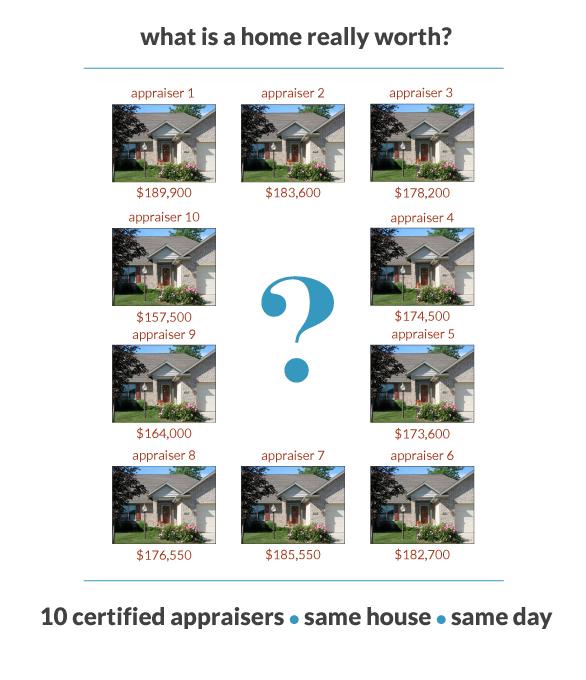Reader Question: I am purchasing a home. Lender appraisal (A) value came back $48,000 lower than the contract price. Sellers disagreed and argued it was a bad appraisal. I agreed to get a second opinion. Appraisal (B) came back $5,000 over contract price. The two appraisals are miles apart. I was shocked because I was expecting a $10,000 – $20,000 differential based on additional comps the sellers provided to the Lender for re-evaluation. Now I’m wondering if I’m overpaying with this massive differential of $53,000. What are some options for these types of situations? Should I bother to challenge appraisal (B) if I have concern over the comps (e.g., lake properties or properties with significant land used as comps) or home improvement adjustments?
Monty’s Answer: The location and price range of the home you want to buy is unclear but based on the information and the facts you have outlined; it appears that you have good reason to be waving the red flag. First, some observations:
- What is unusual is the seller is furnishing comparables. Typically, the appraiser picks the comparables with no input from the seller. It was likely the agent that came back with the comparables. Regardless which of them introduced new comparables, a conflict of interest exists here. This article about valuing a home may be helpful to you, like another article about why making adjustments to homes is often tricky. Picking comparables is a judgment. Manipulating values can happen by introducing comparables that may not be the best comparables. Here is an article that demonstrates a wide range of value on an actual appraisal.
- If the house is in the $500,000 range or higher, a $53,000 swing between the most conservative and optimistic valuations may indicate the range of value is appropriate. If the home is in the $250,000 range, the value difference seems too broad. However, when making adjustments to the selected comparables, the fewer adjustments between the subject and each comparable are generally the best comparables. If comparables are rare, it can lead to larger adjustments. In the range of value article, the subject property was about 38 years old but had experienced extensive remodeling with upscale materials. The effective age of the subject was about 10-15 years. Municipal sewer and water was available but not utilized, and the appraiser recognized these facts in choosing newer comparables.
- The best way to review comparables is to drive by them. Real estate agents do not have to drive by comparables, but real estate appraisers must drive to the comparables. Here is an article about how to challenge a home appraisal that you may find helpful.
- Consider reviewing or challenging both appraisals, not just appraisal (B).
With this background information here are some options (there may be more) for you to consider:
- Hire a third appraisal on your own. When the lender hires an appraiser, the appraiser is working for the lender – not for you. The lender retains the appraiser you pay for to ensure their capital is not at risk. It is called a mortgage loan appraisal. Your instructions to the third appraiser are to appraise for the fair market value, as opposed to a mortgage loan appraisal.
- Drive the comparables of the current appraisals. Ask your real estate agent for an MLS printout of every single comparable sale within a reasonable distance. What is reasonable could be within a mile or five miles of the home. You want to verify that the appraiser(s) or the agent is not cherry-picking the comparables to influence the outcome. Many lenders want comparable sales within the last six months, but my opinion is that they can be even a year or two old, and to adjust for the time if the comparables features are very close to the subject property. Then, if after this review you are still not satisfied, you can hire the third appraiser.
- Acquiesce and go along with appraisal (B). Your resolve to own the home defeats your concern.
- Walk away from the contract if you can without a penalty. You can always fall in love with another home.
Your conclusion will be influenced by numerous factors; emotions, search time, patience, finances, and more. A fifty-three thousand dollar swing may be in the ballpark, but in reviewing the material here, you have more information to help you make an informed decision. The goal is a well-reasoned range of value with which you are comfortable. It takes effort on your part, but your job here is to determine which appraisal is right.

